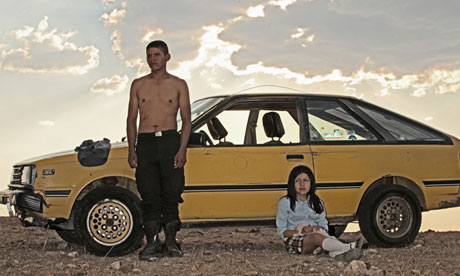After a successful festival tour, including winning Best Director at last year’s Cannes Film Festival, Heli arrives with relatively little fanfare. The film has got a cooler reception from critics than festival juries, which at least goes to disprove any idea that critics favour for prestigious films just because they’re miserable. Usually, that’s pure coincidence.
Is Heli just misery porn? Tackling the issue of drug cartels will be necessarily grim; told from a Mexican viewpoint, Heli doesn’t have the self-aware style of Breaking Bad or Soderbergh’s Traffic. What it does have is grit, violence and more grit. It centres on Heli (Armando Espitia), a young factory worker who lives with his wife, young son, sister and father in rural Mexico. Their lives primarily consists of keeping their heads down to avoid cartel activity forever haunting the frame from the sidelines. Heli’s sister Estela (Andrea Vergara) disturbs this fragile balance when she and her army cadet boyfriend Alberto (Juan Eduardo Palacios) procure heroin seized from the cartel and plan to sell it. Heli finds out and tries to hide the drugs, but right from the start this obviously cannot end well. This is clear when, in one of the first scenes when Estela adopts a stray puppy. Any film fan worth their salt knows Fido’s done for, and so it goes when the cartel come looking for their misappropriated stash at Heli’s house.
Heli paints a portrait of rural Mexico as a hellish desert ruled by the lawbreakers, rife with corruption and torture. After the raid on Heli’s house, Heli and Alberto are taken by the cartel for some enhanced interrogation involving humiliation and the use of lighter fluid in conjunction with certain body parts. Escalante serves up a grim film, with shocking moments (violent and otherwise) and an unrepentantly dour tone. All this would be fine if Heli had something new to say about life in the shadow of the drug dealers. Escalante’s script hints at themes of guilt, revenge and redemption, but the themes risk being sacrificed to shock value. Admittedly, the portrait of the close family ties of Heli and his family are well established. The performances are strong from all concerned, while Escalante and his cinematographer Lorenzo Hagerman’s no-frills approach adds heft to the drama and the violence.
As a story, Heli works even though the characters struggle to crawl out from underneath the remorseless grim tone weighing the film down. Escalante must presume the travails of this family are enough to carry the film through, but it could have used more satirical bite. With this material, the scope for commentary is vast, but it’s scarcely explored. Heli has to ensure its memorability with shock, because it’s just not as smart as the filmmakers seem to think.

